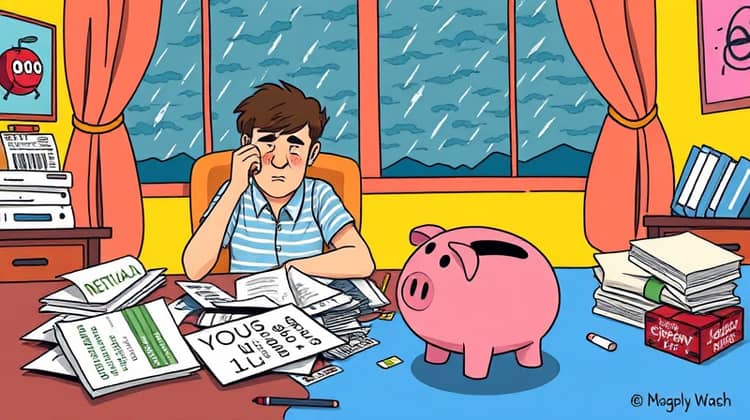Personal Finance Blunders: 6 Mistakes to Avoid for a Better Future

In today's fast-paced world, making sound financial decisions is crucial for ensuring a secure and prosperous future. However, many people fall into common personal finance traps that can jeopardize their financial health. Understanding these pitfalls is the first step towards avoiding them and leading a more financially responsible life.
This article outlines six key mistakes that individuals often make in their personal financial management. By recognizing and addressing these issues, you can take proactive steps toward a more stable and promising financial future.
1. Not Having a Budget

One of the most common mistakes in personal finance is failing to create a budget. Without a budget, it's difficult to track income and expenses effectively, often leading to overspending and financial stress.
A budget serves as a financial roadmap, guiding your spending and saving habits. It allows you to allocate your income toward necessary expenses, saving goals, and discretionary spending.
Without a proper budget, financial goals might become distant dreams instead of achievable targets.
- Failing to track monthly expenses
- Not prioritizing savings and investment goals
- Living paycheck to paycheck
Establishing a budget can put you back in control of your finances, helping you make informed decisions, and building wealth over time.
2. Ignoring Emergency Savings

Emergency savings are funds set aside to cover unexpected expenses, such as medical bills, car repairs, or sudden job loss. Neglecting to establish an emergency fund leaves individuals vulnerable in times of uncertainty.
Without a safety net, those unexpected costs can quickly spiral into debt or financial crises, which may take years to recover from. Many people do not realize the importance of having a few months’ worth of living expenses saved up.
It's recommended to have at least three to six months of expenses saved in an easily accessible account to ensure financial security during tough times.
- Living without a financial cushion for emergencies
- Relying solely on credit cards for unexpected expenses
- Not proactively building savings despite financial stability
Taking the time to create an emergency fund can provide peace of mind and financial security, allowing you to weather life’s unexpected storms.
3. High-Interest Debt Accumulation

High-interest debts, such as credit card balances, can accumulate rapidly and become a significant financial burden. Many people underestimate how quickly these debts can grow, leading to severe consequences over time.
Accumulating debt often results from impulsive spending habits, lack of budgeting, or emergencies that lead to reliance on credit. The high interest rates can compound over time, drastically increasing the total amount owed.
Once in debt, the priority should be to pay it off to avoid exorbitant interest charges and the stress that often accompanies financial struggles.
- Identify high-interest debts and prioritize paying them off first.
- Consider consolidating debts to lower interest rates.
- Create a plan to increase payments on your debt while reducing unnecessary expenses.
By addressing high-interest debt early on, you can alleviate financial pressure and redirect your focus toward building wealth instead of simply maintaining a cycle of debt.
4. Neglecting Retirement Savings

Retirement savings are a crucial aspect of financial planning, yet many individuals neglect to set aside funds for their golden years. Delaying contributions can lead to a significant gap in retirement savings, jeopardizing future financial stability.
- Relying solely on Social Security benefits for retirement income
- Not taking advantage of employer-sponsored retirement plans
- Procrastinating on retirement savings until it's too late
Starting to save for retirement early, even in small amounts, can take advantage of compound interest and provide a more comfortable retirement.
5. Living Beyond Your Means

Living beyond one's means is a prevalent issue that can lead to financial distress and debt accumulation. This often occurs when individuals prioritize lifestyle over financial responsibility, succumbing to societal pressures.
When people spend more than they earn, they may resort to credit to maintain their lifestyle, which creates a cycle of debt that is difficult to escape. Assessing one's financial situation honestly is essential for making realistic and responsible spending choices.
- Analyze your income and set spending limits.
- Differentiate between needs versus wants.
- Cut back on luxury expenses to align with your budget.
By living within your means, you can avoid unnecessary debt and instead build savings for future goals.
6. Lack of Financial Education

Many individuals enter adulthood without a strong understanding of personal finance concepts, which can hinder their ability to make informed financial choices. A lack of financial education often leads to poor money management practices and misinformed decisions.
Investing time in understanding financial literacy can pay dividends; becoming familiar with budgeting, investing, debt management, and savings can empower you to take control of your financial future.
- Overlooking the importance of financial literacy courses
- Failing to seek help from financial advisors or reputable resources
- Relying solely on advice from friends and family without proper research
Improving your financial education is a lifelong journey that can significantly enhance your financial well-being and security.
Conclusion

Avoiding common financial blunders is a pivotal step toward achieving financial health and peace of mind. By recognizing these mistakes, you can take actionable steps to create a secure financial future.






